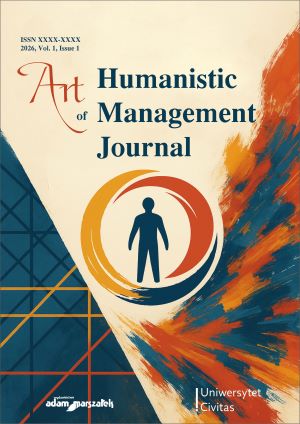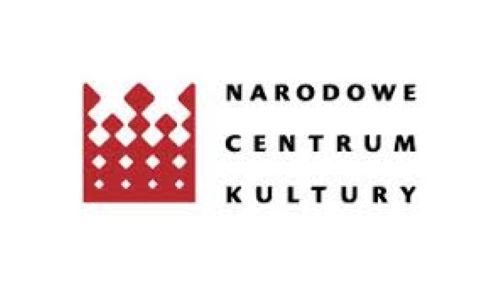Art of Humanistic Management Journal is co-published by Civitas University and Adam Marszałek Publishing House.
Open-access scientific periodical, “Art of Humanistic Management Journal” (AHMJ), dedicated to exploring the intersections of management, aesthetics, art, and humanism. “Art of Humanistic Management Journal” is an interdisciplinary and inclusive platform that reimagines management not merely as a technical or instrumental activity, but as an art (Szostak, 2024a). his approach aligns with the humanistic paradigm in management, which emphasises human dignity, creativity, culture, and social flourishing (Kostera & Woźniak, 2022). At the same time, we recognise that artistic practices themselves are embedded in organisational and managerial processes and can inspire the pursuit of unconventional solutions (Beirne & Knight, 2005; Berthoin Antal, 2011; Safaa et al., 2023). By bridging the art of management with the management of art, the journal provides a unique space for dialogue across disciplines, perspectives, paradigms, and practices.
Themes covered by the journal (but are not limited to):
- Management as an art: art of leadership, aesthetic leadership, art of creativity, metaphors, narrations (Gahan et al., 2007; Szostak & Sułkowski, 2020; Woodward & Funk, 2010).
- Organisational aesthetics: the role of beauty, truth, meaning, kitsch, reflexivity, and imagination in organisational life (Strati, 1999; Szostak, 2024b, 2025).
- Humanistic management: protecting dignity, fostering well-being, and cultivating life-conducive forms of organising (Caggiano et al., 2024; Melé, 2016; Pirson, 2017; Szostak, 2023b).
- Critical theory: aesthetic and cultural evaluations of instrumentalist approaches to management (Ripoll et al., 2019; Todd, 2022).
- Art management: aesthetic situation, art perception, involvement and satisfaction in the arts, managerial and organisational issues and challenges in artistic and cultural institutions and projects, organising and sustaining creative communities (Quattrini et al., 2020; Szostak, 2022, 2023a; Wȩziak-Białowolska et al., 2019).
- Cross-disciplinary and cross-field insights, dialogues, and reflections for creating a better world to live in (Kostera, 2024; Remesh & Kumar, 2023).
Types of Contributions:
- Research articles (theoretical, empirical, methodological).
- Conceptual essays and reflective pieces.
- Descriptions of artistic or creative interventions with critical commentary.
- Case studies from practice (organisational, cultural, or policy contexts).
- Reviews of relevant books, exhibitions, or artistic projects.
There are no fees related to the submission of a paper.
Scientific Board:
- Prof. Antonio Strati, Dept. of Sociology & Social Research, University of Trento, Trento, Italy
- Prof. Mary Jo Hatch, Centre for Corporate Reputation, Said Business School, Oxford University, UK & University of Virginia, USA
- Prof. Monika Kostera, Professor Ordinaria in Economics and the Humanities, Faculty of Management, University of Warsaw, Poland & Guest Professor in Management, Södertörn University, Sweden & Professeure Invitée à L’université Rennes & Visiting Professor, L’Université Paris Nanterre, France
- Prof. Pierre Guillet de Monthoux, Stockholm School of Economics, Stockholm, Sweden
- Prof. Stephen A. Linstead, DLitt FAcSS Chartered FCIPD, Emeritus Professor of Management Humanities, School for Business and Society, University of York, Heslington, York, UK
- Prof. Monika Karwaszewska, Stanisław Moniuszko Music Academy, Gdańsk, Poland
- Prof. Christian Filk, Department for Media Education, Europa-Universität Flensburg (EUF), Flensburg, Germany
- Prof. Hugo Letiche, ISTEC Business School, Paris, France
- Dr Claudia Schnugg, independent researcher, curator, transdisciplinary art-science consultant, Linz, Austria
- Prof. Katarzyna Szymańska-Stułka, Chopin University of Music (UMFC), Warsaw, Poland
- Prof. Jerzy Kociatkiewicz, Institut Mines-Télécom, Business School, Évry Cedex, France
- Prof. Jorge Sá, senior research fellow at Drucker University (Peter F. Drucker and Masatoshi-Ito Graduate School of Management) in Los Angeles, USA, and a Professor at ISG Business School, Paris, France
- Prof. Manuela Tvaronavičienė, Vilnius Gediminas Technical University (Vilnius Tech), Lithuania & General Jonas Zemaitis Military Academy of Lithuania
- Prof. Muhammad Majid Khan, Department of Management Sciences, COMSATS University, Islamabad, Pakistan
- Dr. John Reuben Davies, Associate Director of Arts Lab, College of Arts & Humanities, University of Glasgow, Scotland, UK
- Prof. Steven S. Taylor, The Business School, Worcester Polytechnic Institute, Worcester MA, USA
- Prof. Wolfgang Amann, HEC Paris Business School, Paris, France, & Doha, Qatar
- Prof. Jerry Buhari, Department of Fine Arts, Ahmadu Bello University, Zaria, Nigeria
- Prof. Blaise Gundu Gbaden, Department of Fine Arts, Federal University of Lafia, Lafia, Nigeria
Editorial Board:
- Prof. Michał Szostak, Civitas University, Warsaw, Poland – Editor-in-Chief
- Wiktoria Olejniczak – secretary
- Dr. Adewale Olusegun Ajayi, Adeyemi Federal University of Education, Ondo, Nigeria
- Dr. Bouameur Assala Belsem, Salah Boubnider University of Constantine 3, Constantine, Algeria
- Danaë Huijser, Universiteit voor Humanistiek, Utrecht, The Netherlands
- Prof. Diana da Silva Dias, Lusófona University, Lisbona, Portugal
- Dr. Djalel Baghzou, University of Constantine 3 – Salah Boubnider, Constantine, Algeria
- Prof. Kemi Ogunyemi, Lagos Business School, Pan-Atlantic University, Lagos, Nigeria
- Prof. Małgorzata Baran, Civitas University, Warsaw, Poland
- Stefano Olcese, University of Burgos, Burgos, Spain
The journal has been granted honorary patronage by the National Centre for Culture.
Contact and cooperation
Professor Michał Szostak, Editor-in-Chief
https://orcid.org/0000-0002-7774-2964
michal.szostak@civitas.edu.pl
Texts for the journal should be submitted directly through the editorial system.



